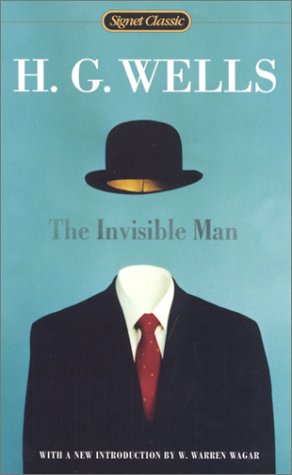Coursera Fantasy and Science Fiction Week 6
Although I only made it 60% of the way through during the week, I enjoyed The Invisible Man and felt I managed to pull a decent essay together.
The Invisible Man - H.G. Wells
In The Invisible Man, Wells continually shifts the forces of antagonism as the story progresses in order to reveal different qualities of his protagonist, Griffin, through their interactions. He does this by making each antagonist represent a different form of morality.
The landlady Mrs. Hall is a sympathetic woman with a strong personal sense of morality based on traditional values of respect and politeness. She tolerates Griffin's brusque manner for business reasons, but stands up to him when he threatens to transgress the boundaries of politeness: "Mrs. Hall was quite alarmed. But she was a resolute woman." Although volatile, Griffin too has standards and knows he should respect her, despite his exasperation: "And he mumbled at her - words suspiciously like curses." Politeness dictates that Mrs. Hall respect her guests' wishes, but Griffin's abruptness begins to grate on her and she refuses to let him dominate her.
Marvel, by contrast is cowardly, corrupted and co-opted into Griffin's emerging scheme. Marvel's weakness is an inadequate source of antagonism, so the villagers must band clumsily together to form a mass of sufficient volume to repel Griffin. Together, they represent a collective form of morality which emerges through their response to circumstance. As the village's response coheres, its response is personified in the policemen who represent the law as the highest form of social morality.
The calm, rational Dr. Kemp is a voice of reason; a man of science and therefore a fundamental threat to Griffin. Through enquiry and debate, Kemp seeks to understand Griffin's problem from a scientific viewpoint while at the same time wrestling intellectually with the moral implications of helping or denouncing a criminal.
These different levels of morality - the individual strength based on traditional moral sense, the collective knowledge of right and wrong, and the intellectually validated moral response - ultimately combine, the people cooperate and the immoral Griffin is overcome.
Responses
Form: 2/3
peer 1 → Good use of language
peer 2 → Your essay follows a very clear, logical structure. It's obvious you've thought carefully about how your ideas relate to each other. My only complaint is that the paragraph about Dr. Kemp does not have as much support as the other paragraphs. I did not take off points for this because I realize we are restricted to 320 words, which makes it nearly impossible to provide equal support for each claim.
peer 3 → Very nicely written.
peer 4 → All in all, your essay is well constructed. (Maybe that's why) I think it needs a better constructed bibliography.
Content: 2/3
peer 1 → Good argument
peer 2 → The ideas are very illuminating and explore an aspect of the novel that I hadn't thought too much about. My only complaint is with the sentence: "in order to reveal different qualities of his protagonist, Griffin, through their interactions." In your essay you do not explore Griffin's qualities so much as the other characters he encounters.
peer 3 → I really liked the topic you wrote on. It definitely added to my understanding of the reading.
peer 4 → I enjoyed your topic. I think you chose a good one and, somehow, developed it well. This could make a better essay (there is a lot more to be said, I bet). Well done!

No comments:
Post a Comment